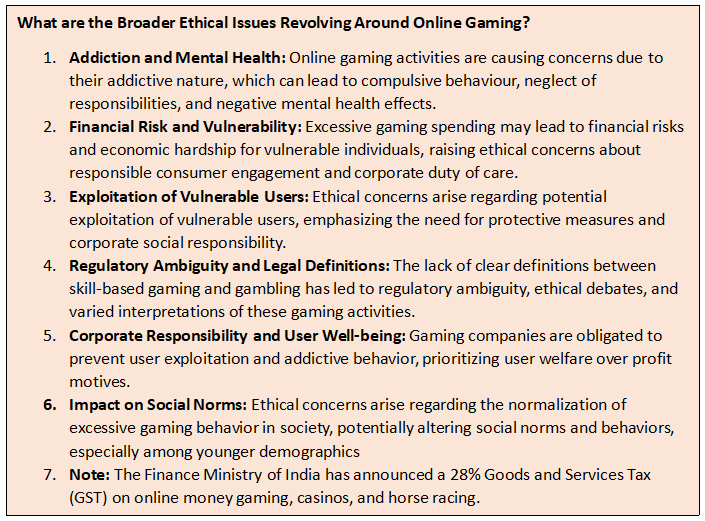Context
The suspension of a Pune Police Sub-Inspector raises ethical concerns regarding online gaming and the role of a law enforcement officer.
What are the Ethical Implications Surrounding the Officer’s Participation in Online Gaming?
Arguments In Favor of Officer’s Involvement in Online Gaming
- Personal Freedom and Individual Rights: Officers, like any other citizen, have the right to engage in legal recreational activities during their personal time.
- Adherence to Legal Norms: Online gaming should be regulated by legal norms and complied with by officers, ensuring their engagement is within the framework of individual autonomy.
- Mitigation of Stress: Online gaming can serve as a stress-relieving tool, providing mental escape and relaxation from job pressures.
Ethics Issues Involved
Violation of Organizational Standards:
- Breach of Code of Conduct: The Maharashtra State Police has imposed a code of conduct prohibiting online gaming without the unit commander’s permission, indicating a disregard for institutional regulations.
- Conflict with Professional Norms: The officer’s ethical conduct in online gaming during duty hours contradicts the expected professionalism and ethical standards in law enforcement.
Negative Public Image and Trust Implications:
- Public Perception and Trust Erosion: Media interviews discussing personal victories in uniform can undermine public confidence in law enforcement officers’ professional integrity and the broader image of the police force.
- Impact on Organizational Credibility: The conduct of officers in the police force can significantly damage its credibility and reputation, as it reflects the institution’s image and public trust.
Role Model Expectations and Ethical Responsibilities:
- Role as a Public Figure: As law enforcement officials, they are expected to act as public figures, exemplifying ethical behaviour and responsible conduct.

Way Forward
Regarding the Conduct of Professionals
- Clear Organizational Policies: The goal is to establish clear guidelines within law enforcement agencies regarding off-duty conduct, focusing on permissible and non-permissible activities, particularly in relation to online gaming.
- Ethical Training and Education: The initiative aims to impart ethical training and education to law enforcement officials, emphasizing the significance of ethical conduct both on and off duty.
- Strengthened Codes of Conduct: The review and enhancement of current codes of conduct, including guidelines for recreational activities, maintaining professional image, and uniform social media usage, are being considered.
- Support and Counseling Services: The organization offers support services and counseling to officers, focusing on stress management and fostering healthy coping mechanisms to cope with the demanding nature of their profession.
Regarding Online Gaming
- Clear Legal Definitions: The goal is to distinguish skill-based gaming from gambling, providing precise legal definitions to uniformly guide regulatory measures across states.
- Collaborative Governance and Oversight: The initiative involves partnering with gaming companies to promote responsible gaming practices, focusing on user protection, addiction prevention, and financial risk mitigation.
- Comprehensive Research and Analysis: The proposal is to invest in comprehensive research on the psychological and socio-economic impacts of online gaming, thereby aiding in the development of effective policy and regulatory measures.





